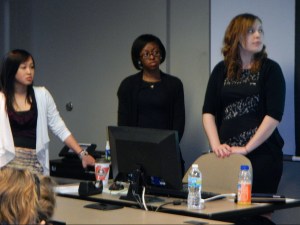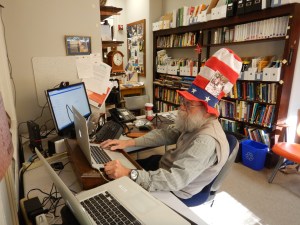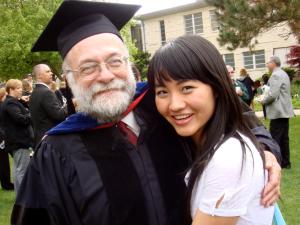
“How long have you taught at Carroll?” I am often asked. I now tend to give the answer that my father-in-law, Golden Pioneer Walter G. Schmidt, gave when I once asked him how long he had been married. With a twinkle in his eye he retorted “forever.” Suffice it to say that when I came here senior faculty looked older to me and students at that time seemed much more my age! And, according to an online quiz my student assistant alerted me to my personality is most like Thanos!

I presently am proctoring my first final exam as I attempt to bring this academic year to a close. By my calculation I have made, given and graded more than 500 final exams since 1977. I am amused by some of my prior rants reflections (below) about the value of giving finals, the challenges of disciplining oneself to complete the task of grading, and the distractions (most self-induced) that temporarily knock me off course winding down. Somehow putting the semester to bed always gets done in time, with integrity, and with a sense of accomplishment.
Curious David Redux: Reflections on Grading.
Two books to read laid out before me: David Pogue’s Essential Tips and Shortcuts (That No One Bothers to Show You) for Simplifying the Technology in Your Life and Jocelyn K. Glei’s Unsubscribe: How to Kill email Anxiety, Avoid Distractions, and Get Real work Done. Each lends themselves to reading and learning when one has short “down times” for learning.
I should be finishing the grading of the exam I gave yesterday while I proctor the exam I am now giving. Yesterday Leo the Grading Dog and I devoted five hours to the uncompleted task–and decided that we needed sleep to continue. I playfully attempted to engage former students on Facebook in a crowdsourcing grading “experiment.” Alas, a lot of LOL’s. About as successful as my tabled crowdfunding proposal:)
Instead, I am reviewing all my past WordPress posts, Tweets, and Facebook Photos as I plan for major projects next semester. I am contemplating pulling all that material together in a “Best of Curious David” e-book. I hope to engage in extensive self-publishing with students, teach a research seminar dealing with “brain fitness/training” apps and interventions, and pull together 40 years of Carroll-related archival documents that really should not be forgotten. My physical office environment could be challenging as the Rankin Hall reconstruction begins–necessitating a moving from the office.
Here are some previous (unedited–I have not checked the links’ viability) musings about final exams. Clearly the fact that I pondered these questions before suggests that I still haven’t come up with a clear answer–yet I see value comprehensive, multifaceted finals despite the costs of time to grade them.
Final Reflections on Final Exams Dec 20, 2009
The last final exam has been graded–the grades submitted electronically.
Final exams began on Thursday this year, but my finals were the following Monday, Tuesday, and Wednesday. Moreover, I chose to do something new within each final exam. These innovations resulted in my not having exams (newly made) ready until the day before I administered them. Such are academic opportunity costs!
This semester I introduced innovations in each of my classes, some common across each class and others unique to each course. Common to each class, I chose to complete the formal part of instruction a week before the end of the semester. I used the remaining scheduled class time for review and for preparing students for the final exam.
For each class, I wrote a blog about the class and invited students to respond to the blog. My primary goal in that assignment was not to increase “hit rate” on my blog site! Rather, I’d like to increase the likelihood that students subsequently might recognize how easy it is to comment responsibly to something “published” on the web. Though it is too early to say whether that goal was met, I was very pleased by the thoughtful comments from my PSY101 students.
Unique to PSY101, I also asked students in my Introductory Psychology class to visit a psychology podcast site and critique for me two episodes. Since I am exploring whether (video) podcasting is something I wish to do (is Audacity the answer?), I found their feedback quite helpful. Their final exam was the easiest to produce (50 multiple choice questions covering the fundamental concepts I cover in the course and 50 points of terminology questions)–and easiest to grade –in part because they provided compelling evidence that they knew the material. They were a fun group to teach and to learn with!
Unique to PSY205, I invited the students (once they had completed their 13 page, cumulative final exam —50 multiple choice, 30 points of terminology, 20 problems requiring students to indicate what data analysis was appropriate—to accept the Robin the Christmas Newf extra credit challenge.

Though I don’t believe in giving extra credit (it undermines intrinsic motivation), I was curious about their abilities to recognize flaws in published articles (the same article I gave my PSY303 class to critique for their final) and poorly designed surveys (the same survey administered to a sample of Carroll employees last week to assess the quality of the workplace). Though only one student (almost) identified the published data analysis error–and none recognized that the response scales of the survey had categories which were not mutually exclusive (and hence potentially invalidate most statistical break-downs), I was pleased that several students rose up to the challenge. And, more importantly to me, a number of students from this class clearly have a mastery of which data analysis to use. But will they have that same degree of mastery the next time I see them–or will they be singing this swan song again?
Unique to PSY303, I gave students in my Experimental Social Psychology course in advance two published journal articles. I also gave them a sense of the kinds of questions I would be asking them about the “Scrooge Effect” and “God is Watching You“ articles. I elected to assess students this way (rather than over course content—e.g. names, terminology, theories, concepts) since a major emphasis of this course involved thoughtfully reading and critiquing published research through weekly student presentations and discussion. I was most impressed by the thoughtful, reflective, insightful responses of almost every student–though none noticed the data analysis flaw.
Why bother giving final exams? Aren’t the 3 to 5 regular exams I give throughout the semester enough? It surely would be so much easier for me to give all multiple-choice questions which students respond to on a computer readable form. However, choosing the easy route would eliminate my opportunity to both assess and to teach during final examination period.
How odd it is that course evaluations occur before final exams are given. Wouldn’t a fairer evaluation of a course (and of the instructor) require that students have taken and received feedback from their final examinations? How frustrating it is not to be able to go over the final with my students and get from them suggestions for improvement in a timely fashion.
Maybe finals should be the last week of class and feedback should be during finals week. Alternatively, maybe a component of course evaluations should be a reflective writing piece the first day of classes. Maybe the first day of classes should be an exam covering the course prerequisites!
Too much grading leads me to think like this and hallucinate about Sugar Plums.

Happy Holidays from Curious David!
December 2014 Musings about Final Exams

It was a foggy 5:30 a.m. morning when I let the Newf out for her morning “duties.” One of many good reasons for driving carefully to Carroll this Saturday morning at 6:30 a.m. I surely would NOT like to hit another deer–nor would Santa or my car.

I can still see fog outside my Rankin classroom. Thirty-seven years ago I was in this very building giving a sample lecture illustrating how I teach as part of my two-day job interview to become a faculty member at then-called Carroll College in Waukesha, Wisconsin. I still have a copy of that presentation–and I remain at my first and only job for better or for worse. So much has changed–buildings, enrollment, technology, the institution’s name, the organizational structure. I feel obligated to protect traditions and overriding institutional historical values, but there are fewer and fewer here that remember them. So many of my former mentoring faculty and staff friends have moved on through retirement or from life. I miss their wisdom but try to preserve their gifts to Carroll.

And here I sit proctoring an 8:00 a.m.Saturday morning final exam covering “Statistics and Experimental Design” taken by students several of whose relatives (aunts, uncles, mothers, fathers, brothers, and sisters) were former students or advisees of mine. 
There are times when they look and behave very young and I recognize that I am 65-years old. Many other times  they keep me young with their energy, willingness to learn, and playfulness. I feel that way especially in the present of my student research assistants–four of whom are graduating this year.
they keep me young with their energy, willingness to learn, and playfulness. I feel that way especially in the present of my student research assistants–four of whom are graduating this year.
It has been a rough semester. I continue to find challenging teaching three consecutive seventy-minute courses in a row with 10 minute breaks even when two of the courses are the same. And this year I am co-chairing the Planning and Budget Committee (with a delightful colleague and poet BJ Best).
It has been the Dickens of a task: The Wurst of Times and the Best of Times. Younger colleagues like BJ, though, and the fewer and fewer remaining colleagues from my past reinforce my willingness to remain here and make a difference before departing.

The chimes just sounded. 10:00 a.m. Eight students remaining. Very good students among which several, should they wish, might join Dr. Simpson’s Neighborhood as student research assistants.
Carroll’s 2014-2015 theme is “Time.” I just finished reading David Mitchell’s The Bone Clocks. Time to start grading so that I can finishing reading The Book of Strange New Things.
Like this:
Like Loading...















































































 I enjoy arriving at work by 7:15 am. It gives me time to walk around the Art building to discover the many new student and faculty works of art that are showcased in the different galleries. It will be interesting to see on April 23 the finalized versions of the sculptures which students did (including of your truly!). You can learn more about that project by
I enjoy arriving at work by 7:15 am. It gives me time to walk around the Art building to discover the many new student and faculty works of art that are showcased in the different galleries. It will be interesting to see on April 23 the finalized versions of the sculptures which students did (including of your truly!). You can learn more about that project by 















You must be logged in to post a comment.